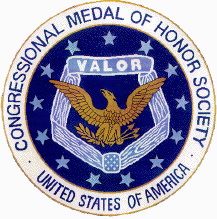|
Para ver este documento
en español, oprima aquí.
Puerto Rico Profile: Carlos James Lozada
October 22, 1999
Copyright © 1999 THE PUERTO RICO HERALD. All Rights Reserved.
This article is the third
in a series of four profiles on Puerto Ricans who have been recognized
by the most distinguished award offered to military service personnel
by the United States government.
"I would rather have that medal
than be president of the United States."
-President Harry S.
Truman
 Throughout
the years, the Medal of Honor, for extraordinary bravery in battle,
has become increasingly more difficult to earn and the esteem
given its recipients has dramatically increased. President Harry
S. Truman said, "I would rather have that medal than be president
of the United States," and General George S. Patton said,
"I'd give my soul for that decoration." Throughout
the years, the Medal of Honor, for extraordinary bravery in battle,
has become increasingly more difficult to earn and the esteem
given its recipients has dramatically increased. President Harry
S. Truman said, "I would rather have that medal than be president
of the United States," and General George S. Patton said,
"I'd give my soul for that decoration."
Carlos James Lozada, born in Caguas, Puerto Rico, was awarded
that decoration. He is remembered for his bravery while serving
as private first class during the battle of Dak To, Vietnam, in
1967.
In order to receive the honor, petitioners must supplement
Defense Department records with eyewitness accounts. Claims cannot
be submitted by the intended recipient, and recommendations have
to be made within one year of the performance of the act.
The act that merited Carlos James Lozada the Medal of Honor
began at 2:00 p.m., on November 20, 1967, along a well defined
path in Dak To, Vietnam. Lozada was serving as part of a 4-man
early warning outpost, located 35 meters from his company's lines.
Lozada was the first to see the North Vietnamese army company
approaching the outpost. He alerted his comrades and then open
fired on the enemy who had advanced to within 10 meters of the
outpost.
His "heavy and accurate" machinegun fire completely
disrupted their initial attack. He killed 20 North Vietnamese
soldiers while remaining in an exposed position. He ignored his
comrade's pleas for him to withdraw and fired on the enemy as
they continued their brutal assault. The enemy's intent was to
cut the Americans off from their battalion. Company A was given
the order to withdraw, but Lozada was unwilling to abandon his
position because there would be nothing to hold back the enemy
and the entire company would have been jeopardized.
He shouted for his fellow soldiers to retreat and planned to
stay and provide cover for them. He was already hemmed in on three
sides and any delay in the soldiers' withdrawal at that point
would have been a death sentence.
It wasn't until he was mortally wounded that he ceased his
continuous delivery of heavy suppressive fire against the enemy
and he had to be carried during the withdrawal. He was an example
and an inspiration to his comrades throughout the ensuing 4-day
battle.
Lozada died Monday, November 20, 1967, leaving behind his wife.
He is listed as having died in hostile circumstances in Kontum
Province, Vietnam.
Carlos James Lozada was 21 years old.
| 
